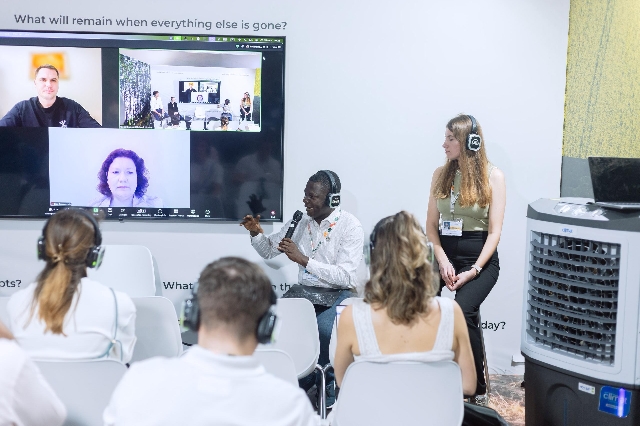Jospong Group outlines blueprint for private sector action in carbon markets at COP30
 Ing. Dr. Glenn Kwabena Gyimah. making a presentation during the panel discussion at COP30
Ing. Dr. Glenn Kwabena Gyimah. making a presentation during the panel discussion at COP30
The Jospong Group is demonstrating how Ghana's private sector can successfully transition from carbon market readiness to tangible climate action, according to the General Manager of the Jospong Green Transition Office, Ing. Dr. Glenn Kwabena Gyimah.
Speaking during a World Climate Foundation panel discussion on the sidelines of the COP30 Brasil Amazonia, Belem climate summit on Friday, November 14, Dr. Gyimah revealed how the company has leveraged Ghana's Article 6 framework to drive both environmental and social impact.
"The clarity brought by Ghana's Carbon Market Office and National Authorisation Framework transformed carbon markets from a policy discussion into a viable business opportunity," he stated.
He outlined the JGC's significant progress since 2024, highlighting five key implementation milestones.
"We have successfully integrated our project portfolios with Ghana's National Carbon Registry, making our composting, landfill gas recovery, and clean cooking initiatives among the first to be officially tracked in the national system," he explained.
He underscored that Jospong Group's approach goes beyond mere carbon credit generation.
"For us, participation in carbon markets represents a fundamental redefinition of the private sector's role in national development," he noted.
"Every ton of carbon we mitigate must tell a social story – creating green jobs, improving agricultural yields through organic fertilisers, and enhancing urban air quality."
Addressing the practical challenges of implementation, Dr. Gyimah acknowledged initial hurdles but highlighted progressive solutions. "While we faced complex MRV protocols and high verification costs initially, through public-private dialogue we've developed workable solutions that maintain both environmental integrity and investment viability," he said.
Dr. Gyimah outlined four emerging models that are shaping Ghana's carbon market landscape, stressing particularly the importance of community engagement. "Our community benefit-sharing model ensures that carbon revenue is reinvested in local development – supporting schools, clean water, and reforestation initiatives," he elaborated.
The Jospong executive concluded with a forward-looking perspective, stating, "Our experience demonstrates that when government and business work in synchronisation, carbon markets become more than just transaction platforms – they evolve into powerful instruments for sustainable national development and green growth."
Source: Classfmonline.com/Cecil Mensah
Trending News

'Commercial farming is Ghana’s future': Ayariga bemoans multibillion-dollar drain, warns against dependence on imports
17:44
OSP rejects Martin Kpebu’s claims of “Self-Investigation,” describes allegations as misleading
07:14
Kwabena Agyepong's campaign manager endorses Bawumia ahead of NPP presidential primary
07:38
Accra Mayor preps city for Christmas, leads sanitation and beautification drive
19:41
WAEC exec outlines skills gap causing decline in math performance
23:39
Nungua Stool defends government board appointee Ben Danso amid land dispute
17:38
Ofankor-Nsawam-Kumasi road: President Mahama pleased with 'rapid progress' after last visit 90 days ago, anticipates April 2026 finish
01:17
Minority demands prosecution over alleged GHS10m overspending at Transport Ministry
08:33
Ablekuma West MP secures jobs for constituents through targeted lobbying efforts
09:36
Ghana AIDS Commission reaffirms commitment to ending HIV epidemic by 2030
10:54




